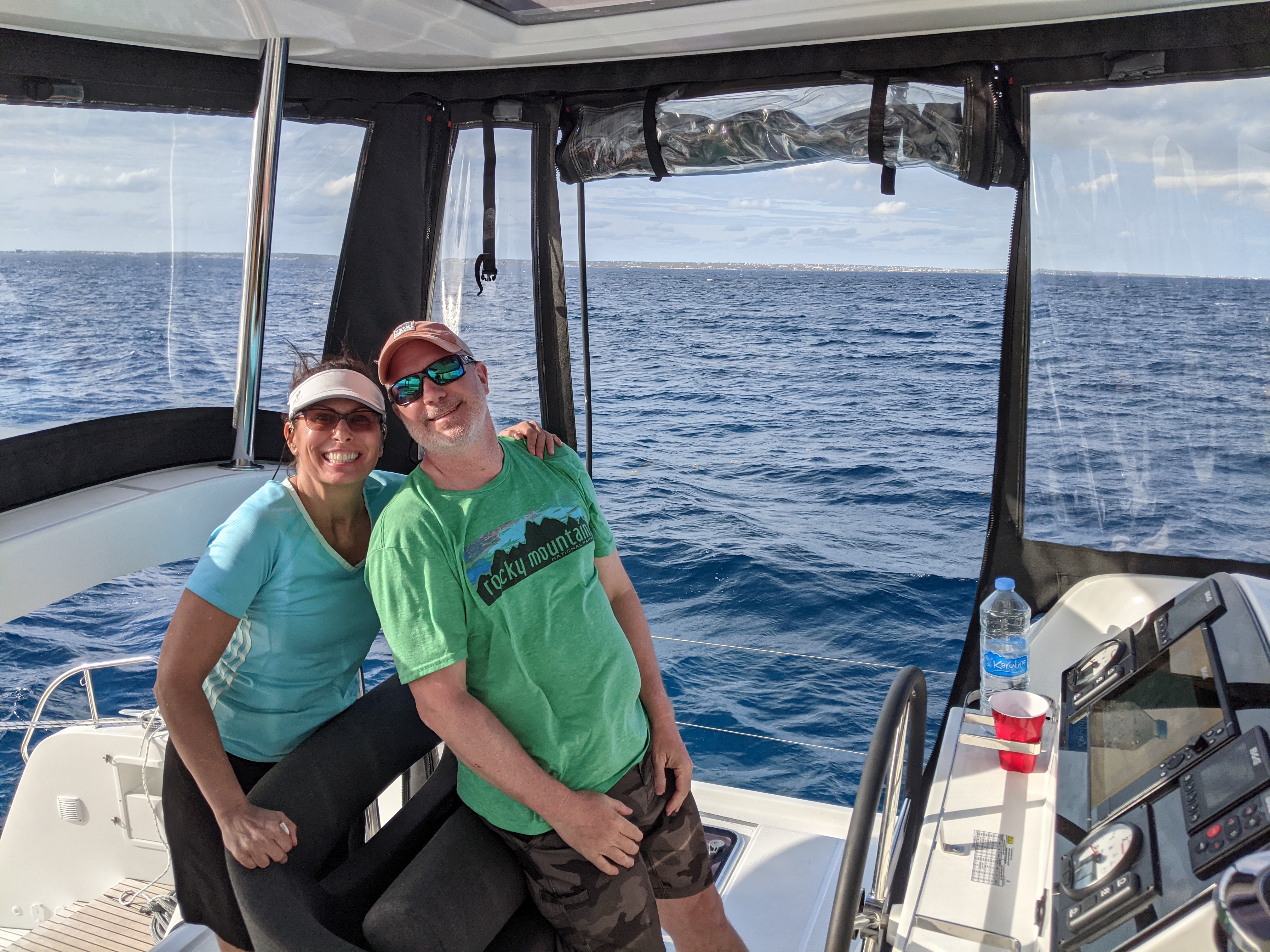I am in a very unique position to write this article, I am currently retired and living on my Lagoon 42 sailing catamaran and my full-time job before I retired was as a Financial Planner. I had my own Financial Planning practice in Ohio.
There are a lot of ways to retire on a boat. First of all you need to decide what kind of boat, new or used, catamaran or monohull. The purpose of this article is not to discuss the merits of each type of vessel, but there is a lot that goes into your decisions.
I strongly recommend not having a loan on your boat. Boat maintenance is expensive enough as it is, adding a loan on top of that expense while retired is foolish.
Income and Assets
The main thing about retirement in general, not just retiring on a boat is how do you have your assets positioned and how will you generate income in the future. There are lots and lots of ways to set up your personal finances to generate income. Maybe you’re in your mid sixties and you have a pension, Social Security and retirement savings. You need to understand how you can take the income sources (pension and SS) as well as generate an income from your retirement savings to pay for your annual expenses now, plus offsetting the effects future inflation (devaluing of currency) will have on your expenses.
My situation is different, I retired at 50 and have no SS income, pension or government run health insurance scheme. My Wife has a very small pension. Our income comes entirely from our rental houses as well as our investments. Note, since we are not 59 ½ we cannot withdraw from our retirement accounts without penalty, so we are not utilizing those. Sometime in the future we will use them though. It’s all part of the plan.
If this topic is enough to make your head spin, you should probably hire a professional to help you. It is well worth the money. The main thing I would stress to someone is you need to be savvy about what inflation is going to do to your budget and how you are going to increases your income in the future to offset the effects of that inflation. This is a huge deal over the long term of retirement.
Pro Tip: If you’re not already, get familiar with the four percent rule. Without going into much detail, the four percent rule says you can start taking four percent off of your assets without depleting them over a 30 year period.
Full or Part Time Cruising vs. Living at a Stationary Location
I have a few sets of friends I have met along the way who live on their boat at the dock in a marina and they occasionally take out their boats once or twice a month during the summer. This is quite a departure from full-time cruising and you have different expenses associated with either type of lifestyle. Do you just want to live on your boat full time, or actively be sailing and cruising.
Living on a boat at the dock is similar to living in a house, cruising full time is quite different. If you’re at the dock you can be plugged into shore power full time to get your electricity and water. If you are cruising full time you need to have a way to generate electricity, and either make your own water or find places to get potable drinking water along the way.
We have a large solar array and a desalination water making device on our boat, so we are pretty much sufficient off grid.
Budget
Our largest budgetary expenses by far are boat insurance and health insurance. Other major items include food, beer, boat maintenance, upgrades, cell phone, internet, fuel, travel, etc.
Most of your expenses like food will remain the same, but if you are cruising to different countries they can be more or less expensive based on the location. Some expenses like clothing will decrease significantly depending on your location. We generally live in bathing suits and t-shirts and wear flip flops.
I’m not going to lie, if you have some type of government insurance, and a pension or social security, although I despise both of these institutions, it is much easier from a budgetary perspective.
You don’t necessarily need fancy software or excel to do a budget. A legal pad and a calculator work just fine.
A sample monthly budget for two people could look like this:
| Marina/Dockage/Mooring | $250 |
| Boat Maintenance | $300 |
| Food | $600 |
| Eating Out | $200 |
| Prescriptions | $50 |
| Cell Phone | $60 |
| Internet | $80 |
| Fuel | $75 |
| Propane | $10 |
| Clothes | $20 |
| Laundry | $50 |
| Boat Insurance | $150 |
| Health Insurance (ours is much more) | $200 |
| Healthcare/Co Pays | $50 |
| Predict Wind | $50 |
| Charts and Cruising Guides | $20 |
| Customs Fees | $25 |
| Miscellaneous | $300 |
| Total | $2490 |
This is just a sample budget, but these are real world numbers, your lifestyle may dictate a lower or higher budget. There are people sailing around the world on $1000 a month and there area also people living at a marina spending $15,000 a month. Nearly anything is doable.
Inflation
Beware of inflation. For most people inflation was an afterthought until the last few years. What seemingly escapes most politicians is that inflation is caused by governments printing money. It’s that simple.
Even in a low inflation environment inflation is a killer. Expect that your living expenses will double every 20 years or less dependent on the rate of inflation. Governments around the world will not stop printing money.
So the big question is how are you going to offset inflation, I highly recommend having a plan to deal with what inflation is going to do to your budget. An extra pot of money saved and invested solely for inflation is a really good idea.
Boat Maintenance
This is a huge topic that many sailors completely disagree on. For sake of simplicity this does not include upgrades, you can spend tens of thousands of dollars upgrading your boat, and many people do.
Boat maintenance is things like oil and filter changes, polishing and waxing gelcoat, bottom paint, haul out and yard fees, standing and running rigging replacement, seals, varnish, sandpaper, etc. and the labor cost associated with all of this work.
A rule of thumb for many is that they spend 10% of the cost of their boat annually maintaining it. In my opinion this is a terrible rule of thumb. Now if you buy a $20,000 boat and hire out all of the labor and materials you will probably be above this 10% number pretty quickly. If you buy a $500,000 boat and do all of the work yourself you probably be well below this number. It’s all relative.
The thing you need to plan and budget for is that there will be work that needs to be done. Can you and are you willing to do the work yourself? This saves a lot of money. Painting, sanding, polishing, changing fluids and filters takes relatively little expertise to learn to be competent at, and can be done over time. Youtube and the internet are great resources. Stuff like engines and electronics can be more complicated, but can also be learned.
I’m not an engineer or mechanic, but I do nearly all of the maintenance myself. We have a decent sized catamaran and we probably are at about 2% per year or less. Once we have to do a rigging change or something larger that number will go up, but we save monthly for that.
I put boat maintenance into two lists, stuff that absolutely has to be done (Mandatory) and stuff that is nice to have done (Voluntary). The mandatory stuff are things like navigation light bulb changes when one goes out, replacing chafed lines, oil and filter changes. All of this is vital to the longevity of systems, keeping us safe, and the boat functioning properly. Items like polishing stainless fittings, refinishing the teak deck and polishing the topsides are nice to have done, and make the boat look nice, but it will be there tomorrow if I don’t get to it today.

Boat Insurance
Boat insurance is a huge issue and many people disagree on how to tackle the problem. I say problem because it is very expensive if you can even get it. We have spent hours and hours researching the subject and talking to other sailors and insurance brokers and agents regarding the subject.
Generally there are two schools of thought, one is to simply go without insurance, or only carry liability insurance. The other is carry really expensive insurance. We fall into the second camp.
Many people with older boats do go without insurance or only have liability insurance, these boats generally fall under the $50,000 mark and the theory is to have a robust emergency fund instead of paying for insurance. If your boat is older than 20 years old, getting comprehensive insurance is very difficult. Just about everyone will need liability insurance. Most yards require it to haul out, and you’ll need to do that every few years.
Our boat is over the $50,000 mark and not very old, so we choose to carry insurance. It is very expensive, our second highest budgetary item next to health insurance.
Currently we are using a local agent in the US, but it only covers our boat in the US and Bahamas, once this policy runs out in January we will go with our old broker, who is excellent, so we can go further afield, this will more than triple what we are paying now.
Health Insurance
If you reside outside of the US you probably have some type of government health insurance, you need to find out if this will cover you if you intend to travel abroad. If you are a US citizen and intend to travel abroad, and are under 65 (so not on Medicare) you will either need to go without insurance or get an Expat Insurance Plan. We have an expat plan, and will likely go this route for the next 15 years.
Health Care
Generally speaking, healthcare is pretty good around the world for most routine items. However, and I can speak from first hand experience, if you have a major issue you may want to consider getting to another country, maybe back to your home country, to get specialist advice.
I broke my upper jaw in St. Maarten and was told by a physician there it was fine and didn’t need surgery. Turns out I needed a plate and 4 screws to put it back in place. Glad I went back to my home country to see a specialist.
Life After Sailing
As we age our physical facilities will eventually leave us. One of the main reasons I retired at the age of 50 was because I knew that my goal of sailing around the world might not be doable in my 60’s and 70’s. I exercise and try to eat right, but we can only stave off the effects of Father Time for so long.
Everyone needs to have some type of plan to move back to land, or worst case a home marina. My plan is to sell the boat and use those funds, plus other money we have saved to purchase a land-based home. Right now my ideal spot is in New Hampshire, but I’m sure that will change. Much of this will depend on how our boat depreciates over time. As of right now catamarans are holding their value well, and we spend a lot of time maintaining our boat to a high standard.
I know a few couples who kept their main residence and are renting it out or letting it sit vacant until their time to be a land dweller again. You don’t need to have the plan set in stone, but recognize there will be life on land in the future and a plan on how to get there.

Please comment below or drop me a line if you enjoyed this article. If you are having a tough time with the financial part of this, drop me an email on my contact page. Although since I am officially retired I cannot legally give you investment advice I can point you in the right direction or maybe refer you to someone who can help in your situation.

